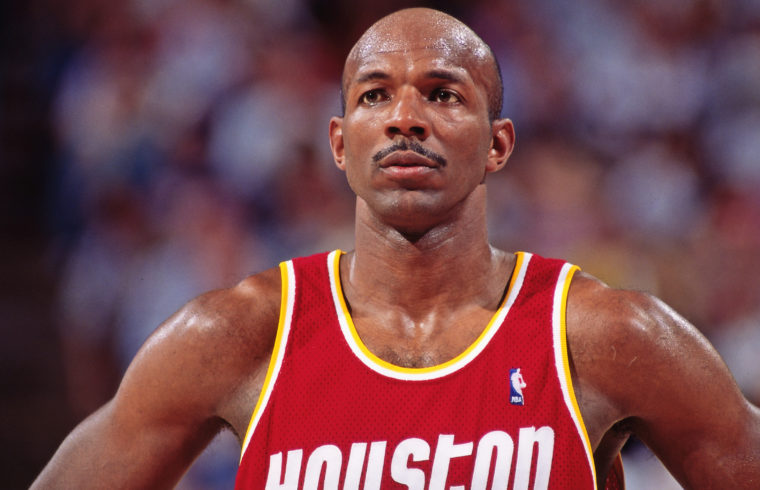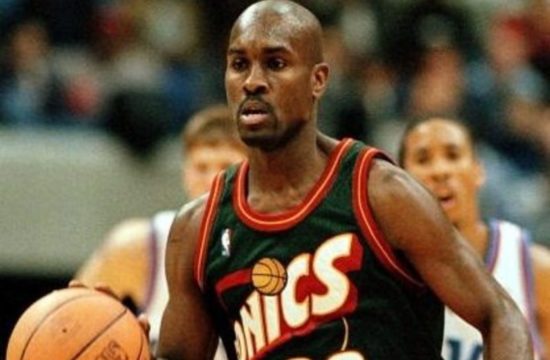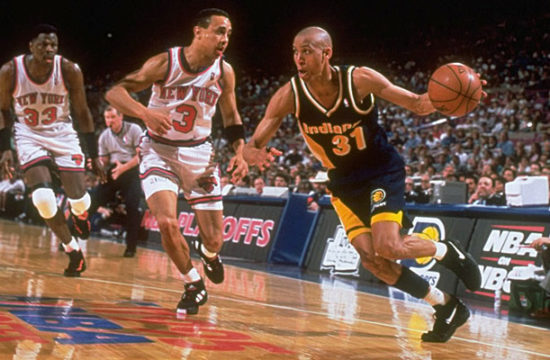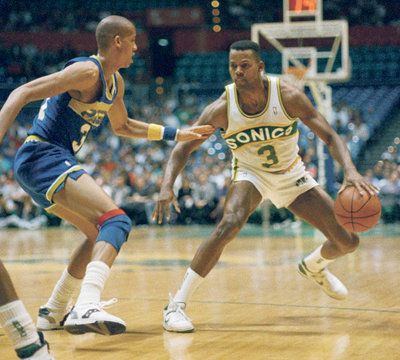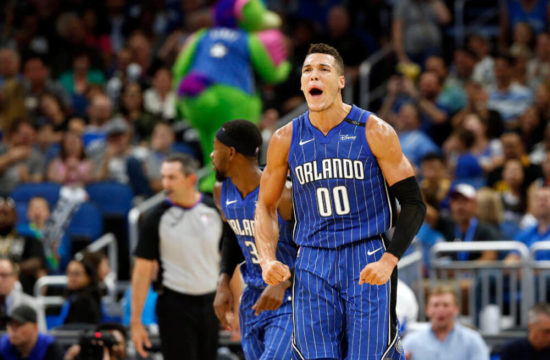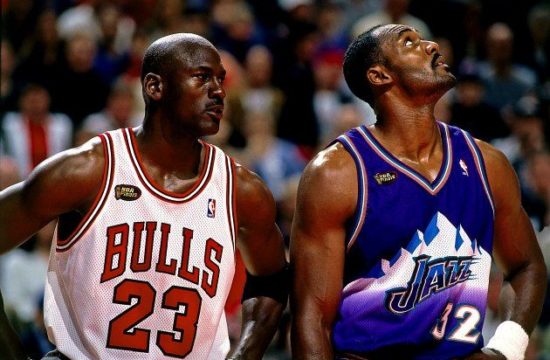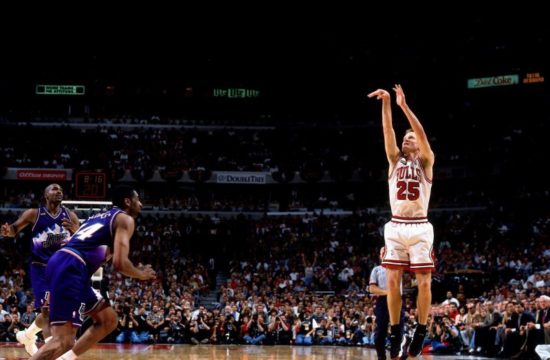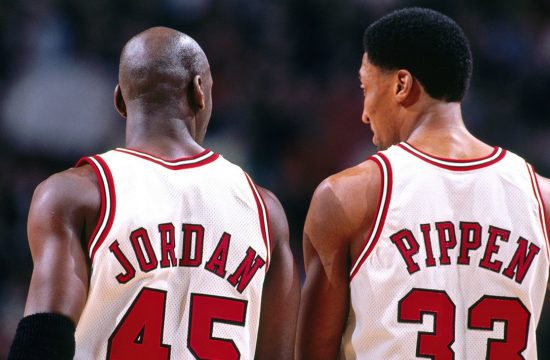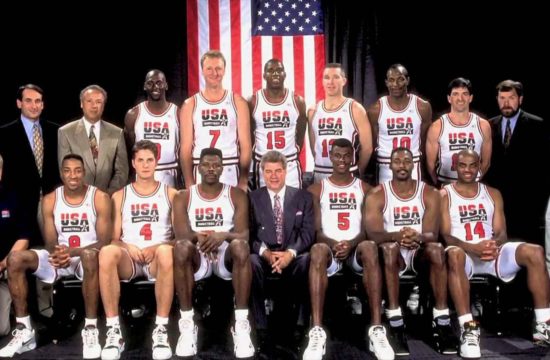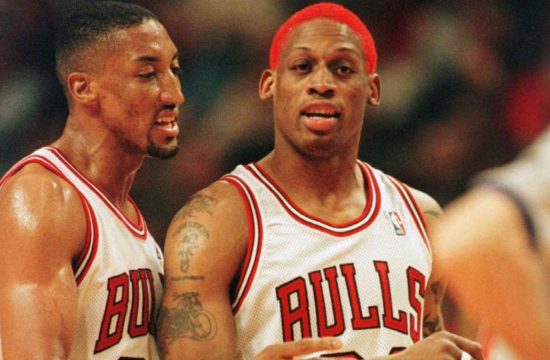Editor’s note: While the sports world is shut down because of the coronavirus pandemic, we’ll occasionally take a look back at notable Houston sports moments from the past. Today: Clyde Drexler announces he’ll retire from the NBA to return to his alma mater Houston to be the Cougars’ basketball coach on March 18, 1998. Here’s the front-page story from the March 19, 1998, editions of the Houston Chronicle:
Drexler returns to UH — Gliding into the future with star from the past
From the moment it became evident that Clyde Drexler would be the next University of Houston basketball coach, it became an event painted in Lone Ranger/Bear Bryant colors: the lone hero, answering Mother’s call, sacrificing his career to restore the Alma Mater to greatness.
Actually, that wasn’t the case at all.
Drexler, it seems, was hardly a reluctant conscript. Not only did he campaign for the job, he did so with a level of enthusiasm that overwhelmed UH president Arthur Smith and athletic director Chet Gladchuk.
“Two weeks ago, Clyde set about to convince me that he was the man for the job,” Gladchuk said Wednesday afternoon. “And the whole conversation changed. He was just certain in his mind that this was what he wanted to do . . . and he convinced me.”
Having talked himself into the job, Drexler took on an even more unlikely quest: convincing ex-teammate Reid Gettys to give up a promising legal career to return to UH, a place that brought him so much happiness as a youth and so much disappointment as an adult. Then, Drexler persuaded George Walker, an assistant coach during Drexler’s college days, to return to Houston as an assistant to his former pupil. In both cases, he succeeded. So there they stood Wednesday afternoon – Smith, Gladchuk, Drexler, Gettys and Walker – basking in a 40-second standing ovation from hundreds of UH fans with thousands of memories begging for a kick-start.
And here’s how Drexler pulled it off.
Facing the final year of his Rockets contract, considering the possibility of playing out the string as the third superstar on a team with room for only two, Clyde Drexler told his agent, Steve Rosner, last October that he would retire at the end of the 1997-98 NBA season.
At about the same time, Drexler had his first “getting-to-know-you” conversations with Gladchuk, who was hired last summer to replace Bill Carr as UH athletic director, and Smith, who had come to Houston from Utah in April 1997 as UH’s president.
Smith and Gladchuk asked Drexler if he would be interested in coaching after his career ended. Drexler expressed some interest; Gladchuk, for one, didn’t take it too seriously.
“I didn’t concentrate much on it at all,” he said. “My focal point was trying to support coach (Alvin) Brooks and support the team through a season that I thought would be successful but obviously wasn’t.”
Rosner didn’t think much of the conversation, either. Drexler, however, obviously did.
“I asked him, `Are you serious?’ and he said, `I’m taking it all in right now,’ ” the agent said. “We had talked about what he would do next year, and I think it was pretty much set that he was going to retire. It was the last year of his contract.
We talked about talking to (Rockets owner) Les Alexander and didn’t think it was the right thing to do. We wanted to see what his level of play would be.”
As the UH season dragged toward its inevitable conclusion, Rosner said Drexler again expressed his interest in coaching after his retirement from the NBA – but only for a job at UH.
“This is the only coaching job in America,” Rosner said, “that he would even think about.”
On March 1, Gladchuk announced that Brooks would be fired at the end of the season. Four days later, UH lost in the Conference USA tournament to finish with a 9-20 record. Within another four days, Smith and Gladchuk visited Drexler’s suburban home to determine if he really was interested in the job. He was.
“Chet gave him a copy of the NCAA manual, which would intimidate anyone who wasn’t serious about this, and we talked about the nuances of the job, the expectations, what it meant to be an employee of the state of Texas,” Smith said. “One thing led to another. His level of excitement was high. Our level of interest was high.”
Rosner and Gladchuk began talking contract at the middle of last week. The deal – at Drexler’s insistence, Rosner said – includes a clause that he return to class to complete the 43 hours he needs for an undergraduate degree. Subsequently, as Smith joked Wednesday, talks included the stipulation that Drexler repay a $25 debt from his college days in the early 1980s.
That was no problem. There was one challenge, however, to come.
Gettys, a senior associate at a Houston law firm and a promising broadcaster who worked this season for ESPN Plus and Fox Sports Southwest, was a more reluctant volunteer. After his UH career ended, Gettys worked as an assistant to Pat Foster at UH in 1989-90. The scars were still fresh.
“We had a real bad experience here with Pat Foster. A real bad experience. Real bad,” he said. “We were very much burned by it and turned off by the profession. Coaching was all I wanted to do.”
When it didn’t work out, he turned to law school, then to broadcasting. And when Brooks was fired, he decided he should tell Gladchuk what UH basketball needed. What he didn’t know – and Gladchuk did – when they talked March 11 was Drexler’s opinion that what UH basketball needed was Reid Gettys.
“I told him, `Chet, I know what went wrong, I know why it went wrong, and I know what can be done to correct it. And when it comes to the people who did the hiring before you came here, I know what they did wrong,’ ” Gettys said. “I told him, `Don’t get somebody who is running away from something, and don’t get anybody running to something.
” `You can win 20 games, go to the NCAAs five years in a row and not be very successful or very popular at the University of Houston.’ It was a good conversation, and I left feeling very good about Chet.”
Ten minutes after Gettys returned to his office, Drexler was on the phone.
“He said, `I’m going to do this, and you’re going to do it with me,’ ” Gettys said. “I said, `Let’s take this two steps at a time. No. 1, what are you talking about? You almost had a triple double last night, and you had 35 points the night before. This is your body talking. It’s March, and you’re tired and hurting, and in August you’ll feel differently.’
“He said, `No, I’m not. I’m playing well because I’m relaxed and I made the decision to retire.’ I said, `OK, let’s move to the second part of this. I’m not doing this with you, Clyde.’
He said, `You are.’ I said, `I’m really not, Clyde.’ “
By the end of the conversation, however, he was. All that remained was to convince his wife, Lisa. As they returned from Austin from what turned out to be Gettys’ final broadcast, the Class 5A and 4A high school boys title games, Lisa Gettys said, “You’ve got to do this. We’ll spend the rest of our lives regretting it if we don’t. We really will.”
And that, it seems, was all Reid Gettys needed to hear.
They all wince at the phrase “marketing ploy,” but no one at the University of Houston denies that hiring Drexler is a good business move for UH athletics.
“That’s justifiable, and it’s to be expected,” Gettys said.
“That’s a very valid criticism. It’s a very fair criticism, and only Clyde, George and I can prove that it’s wrong.”
Drexler’s hiring, however, seems to fill a deeper psychological need.
“The University of Houston is different. You hear that a lot, but it’s true. We are different,” said former UH player Otis Birdsong. “Our supporters are crying out to give us someone we can relate to, give us someone who is part of our family.”
“They seem to need that synergy, and it’s a unique thing,”
Smith said. “Over and over and over, everyone we spoke with came back to that theme: `Build on our history, bring us back our legacy.’ ”
The legacy is back, and so, if one day is any indication, are the fans. UH sold a mere 1,200 basketball season tickets this past season. Wednesday’s sales alone topped 200. If the incumbents renew, that represents a 17-percent increase – and counting.
UH’s ticket office will be open at 8 a.m. today. Friday, however, is a university holiday, and the ticket office was scheduled to be closed. That’s not going to happen.
“There are no holidays in the athletic department,” Gladchuk said, laughing. “Tickets will be on sale.”
Epilogue: Drexler resigned in March 2000 after going 10-17 his first season and 9-22 in his second and final year as the Cougars’ coach.

